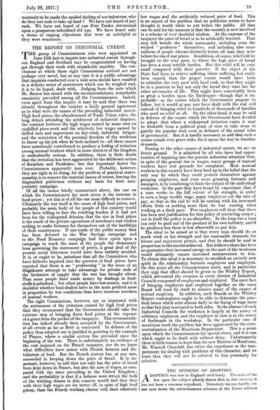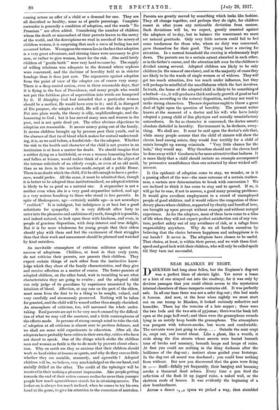THE EPIDEMIC OF ADOPTION.
ADOPTION was rare in England until lately. The state of the law upon the subject plainly shows that in this country it has not been. a common expedient. Nowadays we can hardly run our eyee down the advertisement columns of the Times without coming across an offer of a child or a demand for one. They are all described as healthy, some as of gentle parentage. Complete surrender is generally a condition of adoption, and the words "No Premium" are often added. Considering the number of children whom the death or misconduct of their parents leaves to the mercy of the world, and the descriptions we read in novels of the misery of childless women, it is surprising that such a wave of feeling has not occurred before. We suppose the reason lies in tho fact that adoption is a very great adventure, and stirring times were necessary to give men, or rather to give women, heart for the risk. Also until lately children of "gentle birth" were very hard to come by. The supply of willing relations was adequate to the demand where orphans were concerned, and the doctrine of heredity held us in stricter bondage than it does just now. The arguments against adoption from the point of view of the adopter are of course very many. There is a deep.rooted notion, oven in these reasonable days, that it is flying in the face of Providence, and many people who would not put this faithless piece of superstition into words are hampered by it. If Almighty God had intended that a particular woman should be a mother, He would have seen to it ; and if, in disregard of His purpose, she adopts a child. He will see that she regrets it. Put into plain words, the theory is silly, unphilanthropic, and dis- honouring to God ; but it has moved many men and women in the past, and is not quite dead yet. The other obvious objections to adoption are reasonable. It means money going out of the family. It means children brought up by persons past their youth, and in the absence of that tie of blood which makes for mutual understand- ing, it is, as we said before, a fearful risk—for the adopter. Whether the risk to the health and character of the child is not greater in an institution is at least a matter for doubt. We should imagine that a soldier dying on a battlefield, or even a woman lamenting her sins and follies at leisure, would rather think of a child as the object of the intense solicitude of an elderly couple, or even of an old maid, than as an item in the machine.made.output of a public Home. There is no doubt which the child, if it be old enough to have a prefer- ence, would prefer. All the same, it must be admitted that, though it is better to be adopted than institutionalized, no adopted relation is likely to be as good as a natural one. A stepmother is not a mother even when she in a very good stepmother indeed, and age is a very serious handicap to those who stand in loco pares fir. In spite of Shakespeare, age—certainly middle age—is not nowadays "crabbed." It is indulgent, but indulgence is at best but a good substitute for sympathy. It is very difficult after forty to enter into the pleasures and ambitions of youth, though it is possible, and indeed natural, to look upon them with kindness, and even, in people of gracious disposition, with deep interest and true delight. But it is far more a holesome for young people that their elders should play with them and feel the excitement of their struggles than that their work and amusement should be planned and watched by kind outsiders.
An inevitable atmosphere of criticism militates against the successs of adoptions. Children, at least in their early years, do not criticize their parents, nor parents their children. They expect certain things of each other from the instinctive know- ledge which they share of the family characteristics, and they give and receive affection as a matter of course. The foster-parents of adopted children, on the other hand, wait in trembling to see what characteristics they are going to evolve ; and the adopted child can only judge of its guardians by experience unassisted by the intuition of blood. Affection, at any rate on the part of the elders, must seem from the first to be a thing to be sought, valued, and very carefully and strenuously preserved. Nothing will be taken for granted, and the child will be wooed rather than simply cherished. An atmosphere of criticism, too, will surround the a-hole under- taking. Real parents are apt to be very much amused by the difficul- ties of what we may call the amateur, and a little contemptuous of the efforts made. In persons of strong enough mind to take the risk of adoption at all criticism is almost sure to produce defiance, and we shall see some wild experiments in education. After all, the adopters have probably been critics in their own day, critics who have not dared to speak. One of the things which strike the childless man and woman as futile is the to-do made by parents about educa- tion. Why on earth are they so anxious that their children should work so hard either at lessons or sports, and why do they care so little whether they are amiable, mannerly, and agreeable ? Adopted children will be, we believe, very much indulged on the one hand, and socially drilled on the other. The credit of the upbringer will be involved in their makings pleasant impression. Also people getting towards the end of their active careers realize far more than younger people how much agreeableners stands for in attaining succers. The looker-on is always too much inclined, when he comes to try his own hand at the game, to give his attention to the correction of mistakes.
Parents are greatly moved by something which looks like fashion. They all change together, and perhaps they do right, for children resent in after years any noticeable deviation from custom. Such deviations will be, we expect, greatly resented against the adopters of to-day, but to balance the resentment we must set natural gratitude. Only very little natures could fail to feel some tenderness for those who, where no duty was concerned, gave themselves for their good. The young have a craving for attention. In a normal household the craving is wholesomely kept down. The parents are to a certain extent absorbed in each other, onto the father's career, and the attention left over for the children is divided among several. Adopted children are likely to be only children (in the eenee of one alone), and in the majority of cases they are likely to be the wards of single women or of widows. They will get too much attention, live too much under influence, but they will perhaps be mindful of the unselfishness which the fact involves. In truth, the home of the adopted child is likely to be somethingof a hotbed—i.e., it will produces thick and early growth of good or bad qualities, according to the natural disposition, and may not tend to make strong characters. The new departure ought to throw a great deal of light upon the question of heredity. The present writer knows at the moment of a doctor and his ;sib who have lately adopted a young child of fine physique and morally unsatisfactory antecedents. So far m character is concerned, the doctor asserts absolute disbelief in heredity. Environment is, he declares, every- thing. We shall see. It must be said upon the doctor's aide that, while many people assume that the child of sinners will show the cloven hoof among saints, they would fear terribly for a child of saints brought up among criminals. "Very little chance for the halo," they would say. Why therefore should not the cloven hoof be done away with ? Goodness is far more attractive than badness. It is more likely that a child should imitate an example accompanied by persuasive unselfishness than one actuated by sheer wicked self. interest.
Is this epidemic of adoption come to stay, we wonder, or is it a passing effect of the war—the mere outcome of a certain restless- ness, a certain new determination to break with oonvention ? We are inclined to think it has come to stay and to spread. If so, it will go far to ease, if not to answer, a good many pressing problems. It would give excellent employment to a crowd of unemployed people of good abilities, and it would relieve the congestion of thoso dreary places whore children, supported by charity and bereft of love, are brought up upon precept without example and without nettle experience. As for the adopters, most of them have come to a time of life when they will not expect perfect satisfaction out of any ven- ture, perfect safety out of any avoidance of risk, or a refuge from responsibility anywhere. Why do we all burden ourselves by believing that the choice between happiness and unhappiness is in our hands ? It never is. The adopters have chosen to be useful. That choice, at least, is within their power, and we wish them God- speed and good luck with their children, who will only be called spoilt till they turn out successful.



































 Previous page
Previous page